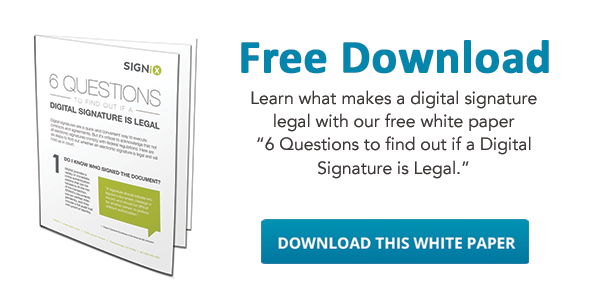
The legal issues surrounding e-signatures can be pretty confusing. Sure, digital signatures are secure, but how do you know that they’ll hold up in court? Luckily, you don’t have to figure it out on your own. Seventy lawyers from the American Bar Association (ABA) spent four years developing the ABA’s Digital Signature Guidelines. We took the ABA’s recommendations to heart by implementing these key guidelines in our products.
1. The Signer Must Be Authenticated
Whenever you do business online, it's important to know who you're doing business with. When it comes to digital signatures, that means using a process called "authentication." Signers can prove their identity by confirming their username and password, their date of birth and social security number or even by entering a secret code sent to their cell phone.
Here at SIGNiX, we provide a lot of authentication options that can be easily customized by the person creating a document. Each signer can be authenticated using a different method, depending on the level of risk of the transaction.
2. There Must Be Disclosure and Consent
For a digital signature to be considered legal, you have to prove the signers knew they were signing a legal document. This is done through legal disclosure and consent, which signers must approve before they are able to sign the document.
SIGNiX provides basic legal disclosure and consent language to meet legal requirements. Depending on your corporate policies or your industry, you might need to customize the consent language. This can be easily done when you set up your MyDoX or EnterpriseDoX account.
3. The Signer Must Know the Signature is Legally Binding
Digitally signed documents are just as legally binding as signatures on paper, and it's important that every signer is aware of the legal impact of signing online. Our signature process can be customized and includes the standard language “I am SIGNER’S NAME, and I agree to be legally bound by this digital signature.” We can also implement a two-step process where the signer acknowledges the legality of the transaction and then clicks “sign.”
4. The Document Must Be Secure from Tampering
When documents are executed in a digital world, there is always a risk for hacking or document tampering. But with the right kind of technology, digitally signed documents can be even more secure against tampering than their paper counterpoint.
At SIGNiX, our products incorporate technologies that make it virtually impossible for document tampering to go undetected. When your documents are signed with SIGNiX, they're protected with a tamper-evident seal. If anyone tries to change any part of your document, you'll easily be able to see that tampering took place.
 5. All Signers Should Have Access to the Document
5. All Signers Should Have Access to the Document
This one is simple. Everyone who signed the document should get a copy of the completed document. At SIGNiX, we provide permanent online access to documents from any computer for all of the signers and those who have review rights for the document. Or if you’d rather, we can provide an independently verifiable version of the document for you to store on your own computer or server.
6. All Actions Taken Should Be Documented
Everything listed in this article is important, and all of it should be logged by your digital signature vendor. If your documents are ever challenged in court, you'll want as much legal evidence as possible to back up your documents.
SIGNiX maintains a detailed log of events (called an audit trail) of every action taken on a document. Every time a signer signs, initials or in any other way changes a document, those changes are automatically logged.
With these considerations in mind, you should be fully prepared to know whether your digital signature service will meet your legal needs. Want to learn more? Download our free white paper "6 Questions to find out if a Digital Signature is Legal."
%20formatted-1.png?width=582&height=170&name=SIGNiX%20Logo%20Main%20(white)%20formatted-1.png)

